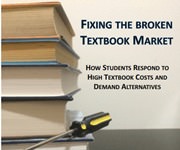
From Inside Higher Ed comes this article by Caroline Vanderlip:
If textbook affordability is the Holy Grail, then those of us who work in higher education are careening Monty Python-like as we search for it, stirring up unnecessary obstacles for ourselves all along the way.
Consider the dual paths we are taking. First, there’s the all-encompassing push to “go digital,” as if somehow the output format of a book, whether it is electronic or print, is the sole determinant of cost.
That is the wrong way of thinking. Input – the price of content – is much more important to the total cost of course materials than output – the format in which those materials are ultimately consumed by the student.
Then, there’s the push to “go open.” In recent years, as concern over textbook affordability has grown, this idea has received much attention, with “open educational resources” — or “OER” materials, as they are often called — leading the charge.
This too, seems attractive, but we are a long way from having OER content dominate the learning landscape, even if much of it is free. The creation of content by academic publishers is part of our literary and reporting traditions, and any system for delivering content to students should take both “free and open” and commercially produced materials into account.































If educators really cared about education they would be forming open learning groups to create freely available digital textbooks. They should also be creating online home schooling courses that covers basic curriculum.
But, like all big power structures, the massive edifice of public education increasingly is about preserving it’s own power. The power and privilege of teachers, administrators, publishers and corporate suppliers is vast and intertwined. Each supports the others.
It’s simply obscene to have somebody involved with education announcing that digital textbooks will cost just as much as paper textbooks because, after all, the high price of commercial books is “tradition” and we wouldn’t want to step on any toes.
As a teacher, I agree with you, Binko. There are plenty of “dirty deals” done between suppliers and education department bureaucracy/business, leaving the students and teachers with compulsory purchase and use of expensive, inferior products. Textbooks are only one aspect of this “business opportunity”.
Education is not a business. It is a service.
This is so true. The format into which the book is published should be irrelevant to the price of the book but it should at least drive the price of the book down a bit since paper is not used in the process. There could be some other factors in place but let’s see how this new generation of online textbooks could help students in the process.
This is simply a self-serving advert for AcademicPub which promotes the false notion that textbooks necessarily contain mostly copyrighted material. They don’t. Textbooks are composed primarily of facts and ideas which are not copyrightable.